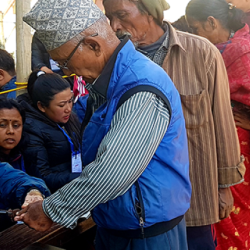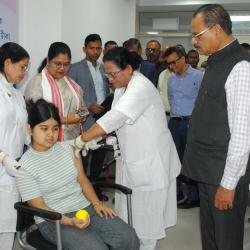Ten years old Anima (name changed) entered hesitantly into the portico pushing the curtain aside. Her steps were unsure and she was looking indistinctly. She was wearing a pink frock flowing to her knees. Her oiled slick hair was tied neatly to her back in a thin pony tail. The frock was much bigger to the size of her lean body. She was so thin that any cloth would not have fitted her skeletal form. The neck of her oversized frock slung low revealing the chest bones and upper ribs clearly. Her skinny limbs and tired eyes misrepresented the picture of a child of her age who would have been otherwise chasing butterflies in the fields or in between the lines of tea bushes. How could they delineate the perfect picture? Anima’s tiny form was torn and tussled by the deadly kiss of the friend called tuberculosis. That fiend had snatched away her dearest younger brother some months ago. Her father too was attacked by the same who died recently of fever even though he had completed the treatment for TB. Yet, somebody felt that this is her age for dreaming of flowers, butterflies, stars and wings – definitely not an age to fight with death! “May she be a part of this wonderful world, living healthy and happy!”, this was his only wish. Yes, it was Dr. Ravi Ranjan Das’s wish. Dr. Das is the medical officer in Shyamguri Tea Estate hospital under ITP company Ltd. Ten years old Anima is a child infected by tuberculosis (TB). Her mother is a temporary worker in the garden. Anima was diagnosed with sputum positive TB a month back and now she has been looked after by the doctor and his team in the hospital so that she can continue her treatment without any break and she gets minimum nutritional requirements from the food supplied in the hospital. Dr. Das is hopeful that Anima will leave the hospital as a healthy child after the completion of her treatment for six months.
TB is fully curable with complete course of DOTS. The treatment and cure of TB has become easier nowadays. Specially, after the intervention of RNTCP (Revised National Tuberculosis Control Programme) and adoption of DOTS (Directly Observed Treatment Short Courses) services by the government, it has become much easier . RNTCP is being implemented in Assam very smoothly. The programme is running under the direction of the Joint Director of health services who is in charge of the state unit. Under the state unit, it is implemented through district and sub-district level units in a cascading manner. The DOTS provider works at the lowest rung and he/she is directly linked to the patients. After confirmation of diagnosis as infected by TB, a patient is supposed to take the medicine from the DOTS provider as directed by the medical officer. The medical officer gets the free DOTS medicine boxes for each TB patient from the local TB unit after the patient’s registration is done. The DOTS provider ensures that the patient completes the medication. A DOTS provider’s jurisdiction is within two kilometers radius of his/her station. Therefore, TB patients are not kept in hospital nowadays if the patient’s health condition is not very critical. Yet, the most important factor regarding the treatment and cure of TB is taking the course of medicine for six months duration without fail or gap. It has been observed that normally TB affects people from the economically weak section who are malnourished. The burden of the disease gets doubled in such families when a person is diagnosed with TB, because such a person requires rest and he/she becomes unproductive for five to six months for not being able to earn. Therefore, it is very urgent to stop TB. The biggest annoying challenge remains with the fact that -people stop medicine half way if they feel a bit better only to succumb to the vicious cycle of TB by which they put themselves in more dangerous health situations as well as invite threat to public health. The risk of Multi Drug Resistant TB (MDR-TB) infection also increases in such circumstances. It is essential to continue the DOTS for six months. Therefore, with the initiative of Dr. Das the tea garden management authority of Shyamguri has made arrangements for TB patients to stay in the hospital as a measure for ensuring continuation of DOTS. However, they spare the patients who understand the related risk factors and the responsibility of taking the medicine. Dr. Das says, “This arrangement ensures the regular doses of DOTS, provides rest to the patient and also ensures consumption of minimum nutritional food during the stay.” The management authority provides this facility to regular as well as temporary workers of the garden. Dr. Das gets support from the nurse cum DOTS provider Tulsi who does not spare any patient without taking the regular DOTS. This is a beautiful example of sensitive caring and dedication. Though this effort of Dr. Das appears to be very small it has significant bearings. There have been considerations on the national level regarding taking up a simultaneous nutrition programme along with DOTS. In this context, Dr. Das’s initiative might become a guiding step for others to carry it forward.
Another 12 years old child TB patient has also been kept in the hospital for treatment. There are three TB patients in the hospital at present out of total five in the garden. Last year the number was 12. Dr. Das informs that they adopt various strategies such as cutting of wages, not allotting work etc. to ensure taking of DOTS. If the husband is infected by TB, generally the wife is recruited for work in his place. If the patient does not come to take DOTS, his wife’s wages will be cut or she will not be allowed to work which invariably forces the patient to take the medicine. With such initiatives TB occurrence has decreased in the tea estate and people have become aware of the disease. There has been no case of MDR TB in the garden. The guiding force behind the initiatives of Dr. Das is the able guidance and commitment of Mr. Manik Roy, the medical officer in charge of TB control programme of Dhekiajuli Primary Health Centre. Mr. Roy says regarding childhood TB that- if parents or somebody in the family is infected by TB, there is maximum chance for a child to become infected. In such cases, preventive medicine is administered for the child to protect and save him from the deadly claws of TB. It is very important on the part of the family members to understand the risk in such situations. TB may become fatal for a child. The child has to go through a very painful process from the diagnosis to the continuation of medication for six months. Hence, it is of utmost priority to save the children from TB. India has the highest burden of tuberculosis in the world. It is very difficult to estimate the burden of paediatric or child TB due to diagnostic difficulties but it is assumed that 10% of total TB load is found in children.
- 9754 reads










Add new comment